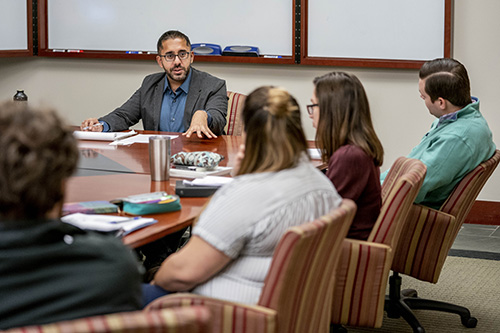 Can an annotated version of a state’s laws that individuals are required to comply with be copyrighted, and potentially available only behind a paywall? That is a key question posed by Georgia v. Public.Resource.org, a case on which the Supreme Court will hear oral argument on Dec. 2.
Can an annotated version of a state’s laws that individuals are required to comply with be copyrighted, and potentially available only behind a paywall? That is a key question posed by Georgia v. Public.Resource.org, a case on which the Supreme Court will hear oral argument on Dec. 2.
In an amicus brief, a team of students in Vanderbilt’s Stanton Foundation First Amendment Clinic argue that the state of Georgia’s practice of copyrighting annotations to state law violates First Amendment and Fourteenth Amendment rights of its citizens. Georgia’s practice limits access to the privately published Official Code of Georgia Annotated only to those who can afford to buy the print version or subscribe to the LexisNexis online legal research service.
Although the Official Code of Georgia is publicly available, the annotated version, known as the O.C.G.A., is considered authoritative. The O.C.G.A.is produced by a division of LexisNexis under the direct supervision of the state’s legislative branch. Courts routinely cite the O.C.G.A., and it contains revisions to statutes and additional statutes that do not appear in the publicly available Code.

Working under the direction of Assistant Clinical Professor of Law G.S. Hans, the First Amendment Clinic team drafted and filed an amicus brief raising First and Fourteenth Amendment concerns on behalf of two nonprofit public advocacy groups that defend citizens’ constitutional rights: the Tennessee Coalition for Open Government and the Florida-based Human Rights Defense Center.
The case originally arose out of a challenge brought by the state of Georgia against Public.Resource.org after the nonprofit organization purchased the 186-volume print edition of The Official Code of Georgia Annotated, scanned the document, and published it online. The Georgia state commission that supervises revisions to the O.C.G.A. sent Public.Resource.org several cease-and-desist letters, alleging copyright infringement. The U.S. District Court for the Northern District of Georgia ruled in favor of the state, accepting the state’s contention that the annotations included in the O.C.G.A. do not have the force of law. Public.Resource.org appealed, and the Eleventh Circuit Court of Appeals reversed the district court’s decision, ruling that, as the authoritative source of state law, the O.C.G.A. was not eligible for copyright protection.
“By imposing financial barriers to accessing its official Code, Georgia diminishes the ability of its citizens to access the authority that governs them,” the clinic’s amicus brief states. “Georgia thus undermines core constitutional values and norms underlying the First Amendment as well as the Fourteenth Amendment’s Due Process Clause, both as applied to the general public and to society’s most vulnerable populations.”
“This is a very provocative and important case, given how many states — including Tennessee — have a similar statutory structure to Georgia’s, and how many citizens are affected by not having access to the law,” Hans said. “While many amici focus on copyright doctrine, I’m excited that we were able to find strong First and Fourteenth Amendment arguments for ours, in keeping with our clinic’s focus on free speech, expression and access issues. It’s also impressive that three students were able to produce such a strong amicus brief, having never written one before, on a complex topic in under two months. I’m exceedingly proud of them and their work.”
Muna Abdallah ’20, a member of the student team that drafted the brief, noted that other states also had copyrighted versions of the statutes governing their residents. “If citizens don’t have access to the law and are unable to know the law in its entirety, their ability to participate in government is diminished,” she said.
The team also included Thomas Conerty ’20 and Alex Cull ’21.